
It has become fashionable recently to declare, "Oh no, I don't read short stories!" as if to admit you did, instead of talking about the latest novel, casts aspersions on your stamina to make it through 400 pages instead of a measly‒sounding ten or even two‒page story. But—apart from the fact that holding short stories and novels up against one another is as misleading as comparing poetry and, say, feature films—short stories are anything but lightweight and unsatisfying. Anyone who loves to read but picks only novels is missing out on a whole section of the garden. It may be planted with smaller flowers but is just as rich and varied, and, more importantly, enjoyable, whether your read of choice is literary, chick lit, crime, humour, science fiction, horror, experimental fiction or erotica. Sometimes you can find all of these in one short story collection!
I can't speak for others, but why do I read short stories? Once you've read a truly excellent story, you won't ask again. The best short stories may take the same time to read as to drink a cup of tea, but they leave you feeling as if you've been punched in the stomach. They are so intense, there is not a superfluous word or comma, and they so perfectly fit their length (I am sure we have all read longer works that feel as though they really should have been far shorter). Great short stories leave an impression which can linger for days, or even years ‒ and reading them becomes an addiction. I need my fix of these short, sharp shocks to the system, the ones that don't require the investment of weeks of page‒turning, but that most definitely cause me to be changed by the experience of reading them.
The only requirement for a short story is that it be, well, short. Under 10,000 words or so, but sometimes only two paragraphs. Because of this, a short story is almost as much about what is not said as what is. I prefer the kinds of stories that, by not giving me everything I need to know, make demands on me as a reader, force me to become involved. For me, reading is an active process, and this is the standard by which I measure everything I read, no matter the length. I love the experience of reading a novel, but I am a short story addict. There is really nothing like it.
I have been asked to focus on women writers, but this does not mean a narrowing of the "categories". I prefer this term to the more loaded "genre", which results in great writing being placed only on certain bookshop shelves and often missed by those who don't know they want it. I write short stories and read many short stories. As the editor of The Short Review, possibly the only journal focussing entirely on reviews of short story collections, and author interviews, I try and review at least one collection a month, and this way have opened myself up to writing I never would have found because I didn't think I liked, for example, science fiction.
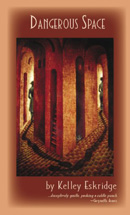 On that note, the first short story collection I want to mention is Dangerous Space by Kelley
Eskridge (Aqueduct Press, 2007). The accompanying press release said this was "feminist science fiction"
and I am embarrassed now at what went through my mind when I read that (female starship commanders,
maternal aliens!). What I discovered were, as I said in my review, poignant, sensual and often poetic
stories, of musicians, actors, theatre directors, journalists, most of whom inhabit worlds much like
my own but with slight twists, shifts of fundamental rules and expectations.
On that note, the first short story collection I want to mention is Dangerous Space by Kelley
Eskridge (Aqueduct Press, 2007). The accompanying press release said this was "feminist science fiction"
and I am embarrassed now at what went through my mind when I read that (female starship commanders,
maternal aliens!). What I discovered were, as I said in my review, poignant, sensual and often poetic
stories, of musicians, actors, theatre directors, journalists, most of whom inhabit worlds much like
my own but with slight twists, shifts of fundamental rules and expectations.
Eskridge also loves to play with language:
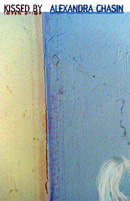 I now read as much "science fiction" as I can, because it is here that writers seem to truly allow their
imaginations free rein, and if that isn't the point of fiction, then what is? Talking about imagination
leads me to Alexandra Chasin's Kissed By (FC2, 2007). She subtitles her collection "innovative
fictions" and these pieces play games with the reader, taking traditional story telling and turning it on
its head—often literally, as one story requires turning the page sideways. As with those Magic Eye
pictures in which you have to relax your focus to see the image, the reader needs to let go and sink
into Chasin's weird and wonderful writing.
I now read as much "science fiction" as I can, because it is here that writers seem to truly allow their
imaginations free rein, and if that isn't the point of fiction, then what is? Talking about imagination
leads me to Alexandra Chasin's Kissed By (FC2, 2007). She subtitles her collection "innovative
fictions" and these pieces play games with the reader, taking traditional story telling and turning it on
its head—often literally, as one story requires turning the page sideways. As with those Magic Eye
pictures in which you have to relax your focus to see the image, the reader needs to let go and sink
into Chasin's weird and wonderful writing.
For example, in the title story, the main character is a figure in a painting, angry that the painter hasn't given him/her a face, longing to be kissed. The opening paragraph is unsettling: "I began, as we all do, by wanting something. I began by wanting somebody, everybody, nobody, to know that I wanted something, but I hardly knew which."
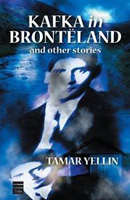 Back on slightly more traditional ground, Tamar Yellin's Kafka In Bronteland (Toby Press, 2006)
doesn't require turning any pages sideways, but does not lack for imagination either. These stories,
written by the daughter of immigrants, take the themes of identity and belonging, re-imagining them in
many different ways. For example, the first story begins: "My father, Odysseus, had a lust for travel
but after their marriage my mother Penelope insisted that he settle down." The legendary Greek hero is
here a Jew longing to return to his homeland but pathetically reduced to poring over maps in the potting
shed with his son.
Back on slightly more traditional ground, Tamar Yellin's Kafka In Bronteland (Toby Press, 2006)
doesn't require turning any pages sideways, but does not lack for imagination either. These stories,
written by the daughter of immigrants, take the themes of identity and belonging, re-imagining them in
many different ways. For example, the first story begins: "My father, Odysseus, had a lust for travel
but after their marriage my mother Penelope insisted that he settle down." The legendary Greek hero is
here a Jew longing to return to his homeland but pathetically reduced to poring over maps in the potting
shed with his son.
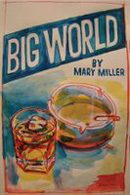 Mary Miller's main characters in Big World (Hobart Short Fiction/Long Drive Books, 2009) are all
women and all but one are told very intimately in the first person, as if this might be the same person
at different stages in her life. We are firmly in America here, and this is what might be called "realist"
fiction, no talking paintings, no futuristic visions. Yet Miller never loses our attention for a second,
her characters refusing to do or say what you might expect: "Dana used to sleep with Sean but Avery didn't
like her fucking his friends, so she stopped and their relationship is much better now. He doesn't call
her a whore any more or tell her that their father is turning over in his grave, which she hated because
their father isn't even in a grave. He's in an urn. She's not sure where because her mother moves him
around."
Mary Miller's main characters in Big World (Hobart Short Fiction/Long Drive Books, 2009) are all
women and all but one are told very intimately in the first person, as if this might be the same person
at different stages in her life. We are firmly in America here, and this is what might be called "realist"
fiction, no talking paintings, no futuristic visions. Yet Miller never loses our attention for a second,
her characters refusing to do or say what you might expect: "Dana used to sleep with Sean but Avery didn't
like her fucking his friends, so she stopped and their relationship is much better now. He doesn't call
her a whore any more or tell her that their father is turning over in his grave, which she hated because
their father isn't even in a grave. He's in an urn. She's not sure where because her mother moves him
around."
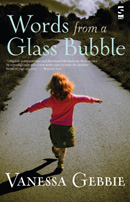 In Words from a Glass Bubble (Salt Modern Fiction, 2008), Vanessa Gebbie takes you to many worlds,
from rural Ireland to Alaska, from a colonic irrigation session to a social worker's office, meeting a
host of characters and hearing a rainbow of voices. From the title story:
In Words from a Glass Bubble (Salt Modern Fiction, 2008), Vanessa Gebbie takes you to many worlds,
from rural Ireland to Alaska, from a colonic irrigation session to a social worker's office, meeting a
host of characters and hearing a rainbow of voices. From the title story:
To take it even shorter, there is flash fiction, short short stories under 1000 words in length, which are the form distilled to its essence. A recent favourite of mine is Stefanie Freele's new collection, Feeding Strays (Lost Horse Press, 2009). Here are 50 or so stories, none more than a few pages long, but so compelling and affecting that I found it hard to read more than one at a time:
These are just a tiny selection of the collections I would love to recommend, each one of which has left me joyful, thoughtful, inspired, in entirely different ways. If I had time I would tell you about In a Bear's Eye by Yannick Murphy, Mary Akers' Women up on Blocks , Elizabeth Baines' Balancing on the Edge of the World, Winter Hands by Annie Clarkson, Carys Davies' Some New Ambush , Lise Erdrich's Night Train, The End of the World by Paddy O'Reilly, Petina Gappah's An Elegy for Easterly, alongside some better‒known names such as Aimee Bender, author of Willful Creatures, and anything by Alice Munro, Ali Smith, A.L Kennedy, Janice Galloway... the list is endless. And then there are the men! But there's no time for that now.
Start with short story anthologies, with many authors between the covers, to find who you like, and then
search out their other works. Read The Short Review for ideas. To all of you who love great writing and
wonderful stories: Read novels. Read short stories. Read everything.
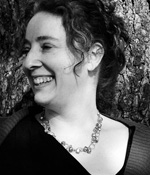
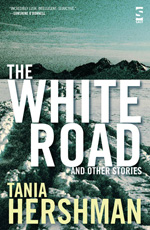 Tania Hershman (www.taniahershman.com), a former science journalist, is the author of The White Road and
Other Stories (www.thewhiteroadandotherstories.com),
(Salt Modern Fiction, 2008) which was commended by the judges of the 2009 Orange Award for New Writers.
Tania is the founder and editor of The Short Review, (www.theshortreview.com),
a site dedicated to reviewing short story collections, the incoming Fiction Editor of Southword
magazine, and one of the judges of the 2009 Bristol Short Story Prize, the 2010 Brit Writers Award and
the 2010 Sean O'Faolain short story competition. She reads a lot of short stories.
Tania Hershman (www.taniahershman.com), a former science journalist, is the author of The White Road and
Other Stories (www.thewhiteroadandotherstories.com),
(Salt Modern Fiction, 2008) which was commended by the judges of the 2009 Orange Award for New Writers.
Tania is the founder and editor of The Short Review, (www.theshortreview.com),
a site dedicated to reviewing short story collections, the incoming Fiction Editor of Southword
magazine, and one of the judges of the 2009 Bristol Short Story Prize, the 2010 Brit Writers Award and
the 2010 Sean O'Faolain short story competition. She reads a lot of short stories.